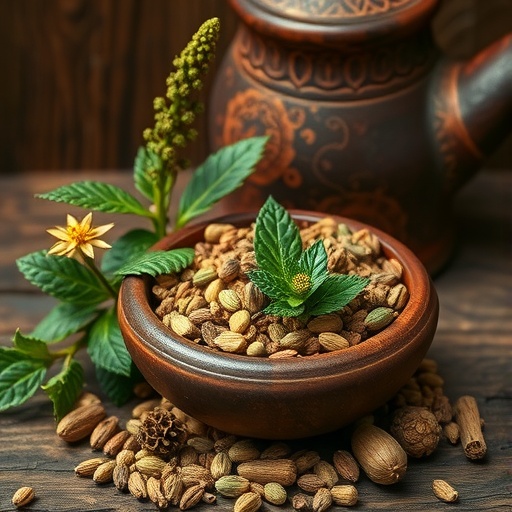In the realm of ethnobotany, the exploration of traditional medicinal practices uncovers a wealth of knowledge instilled in various cultures over generations. A recent study led by researchers Yifru, Tilahun, and Awoke focuses on the Menz Keya Gebreal District, located in the North Shewa Zone of Ethiopia. This region is home to a diverse array of flora, some of which have been utilized for centuries by local communities to treat common ailments. The findings are documented in the forthcoming article in BMC Complementary Medicine and Therapies, shedding light on the valuable practices that persist despite the encroachment of modern medicine.
The significance of traditional medicine cannot be overstated; for many communities around the globe, it forms the backbone of healthcare. In this context, Ethiopia stands out due to its rich biodiversity and cultural heritage. The authors delve into a variety of medicinal plants used by the indigenous population, systematically documenting their applications, preparation methods, and the ailments they are believed to remedy. Such comprehensive documentation is crucial, not just for the preservation of cultural heritage, but also for potential scientific validation of these traditional remedies.
At the heart of the study is the methodology employed by the researchers. They conducted extensive fieldwork, engaging with local healers and community members to gather firsthand accounts of medicinal plant usage. This qualitative approach ensures that the knowledge captured is both authentic and relevant, representing the voice of the community. Such close contact with the local population enriches the study, allowing for a nuanced understanding of the relationships between people, plants, and health.
An intriguing aspect of the research is its emphasis on the specific ailments treated by these traditional remedies. The study identifies a range of conditions, from minor ailments like headaches and digestive issues to more serious concerns such as infections and chronic diseases. By categorizing these ailments alongside the corresponding plant remedies, the researchers provide a scaffold for further investigation into their pharmacological properties. This intersection of traditional knowledge and modern science is where the potential for innovation lies.
Moreover, the article underscores the importance of conservation. As global patterns of climate change and urbanization pose threats to biodiversity, many of these medicinal plants face extinction. The researchers advocate for sustainable practices that protect these botanical resources while also preserving the invaluable knowledge of local healers. This dual approach not only benefits healthcare systems but also ensures that traditional knowledge ecosystems continue to thrive in an ever-changing world.
The role of traditional healers emerges as a focal point within the study. These practitioners often serve as custodians of ethno-pharmaceutical knowledge, possessing insights that are not only profound but deeply rooted in service to their communities. The authors bring to light the critical role that education plays in passing down this wisdom. They highlight the need for programs that can help bridge the gap between traditional and modern medicine, fostering collaboration that honors both practices.
Furthermore, the findings of this study align with a growing global trend towards integrating traditional medicine into mainstream healthcare systems. In many countries, there is an increasing recognition of the importance of complementary and alternative medicine. This study’s documentation of effective traditional remedies is timely, providing a blueprint for health policymakers to consider the incorporation of traditional practices in health programs and interventions.
The implications of these findings extend beyond the local context of Ethiopia. As the global health community gravitates towards a more holistic view of health, there is an increasing need to understand how traditional practices can complement existing medical treatments. The research underscores the value of dialogue between traditional medicine and contemporary research, fostering an environment where both approaches can coexist and enhance overall healthcare outcomes.
While the study primarily focuses on a specific geographical area, its findings resonate on a universal scale. The recognition of the therapeutic potential of plants used in traditional medicine transcends cultural boundaries. As such, the research not only provides insights specific to Ethiopia but also contributes to the broader discourse surrounding biodiversity, conservation, and the importance of indigenous knowledge systems globally.
Importantly, the authors note the ethical considerations surrounding the use of traditional knowledge. The commercialization of traditional remedies raises questions about ownership, sustainability, and the need for fair compensation to local communities. This research aims to inform policy discussions, ensuring that indigenous voices are amplified in the face of potential exploitation. It highlights the necessity of respectful collaboration that prioritizes community welfare while facilitating scientific advancements.
In conclusion, the study by Yifru, Tilahun, and Awoke represents a timely contribution to the field of ethnobotany and traditional medicine. By documenting the intricate relationship between the Menz Keya Gebreal District’s communities and their medicinal plants, the research opens the door for future explorations into these practices. The authors call upon both scientists and policymakers to recognize the profound wisdom embedded in traditional medical systems, advocating for a integrative approach to healthcare that honors the past while innovating for the future.
Such a fusion of traditional knowledge and modern scientific inquiry holds promise not only for the preservation of cultural heritage but also for the advancement of global health. As we increasingly confront challenges like plant extinction and chronic health crises, the insights gained from such studies could very well inform the next wave of therapeutic innovations. With a commitment to sustainable practices and collaborative engagement, the dialogue between tradition and modernity may yield fruits that enhance the health and well-being of communities worldwide.
Subject of Research: Traditional medicinal plant-based remedies for common ailments in Menz Keya Gebreal District, North Shewa Zone, Ethiopia.
Article Title: Traditional medicinal plant based remedies for common ailments in Menz Keya Gebreal District, North Shewa Zone, Ethiopia.
Article References:
Yifru, M., Tilahun, A., Awoke, A. et al. Traditional medicinal plant based remedies for common ailments in Menz Keya Gebreal District, North Shewa Zone, Ethiopia.
BMC Complement Med Ther 25, 411 (2025). https://doi.org/10.1186/s12906-025-05158-5
Image Credits: AI Generated
DOI: https://doi.org/10.1186/s12906-025-05158-5
Keywords: Traditional medicine, ethnobotany, medicinal plants, Ethiopia, health, biodiversity, sustainable practices, healthcare integration, indigenous knowledge.




